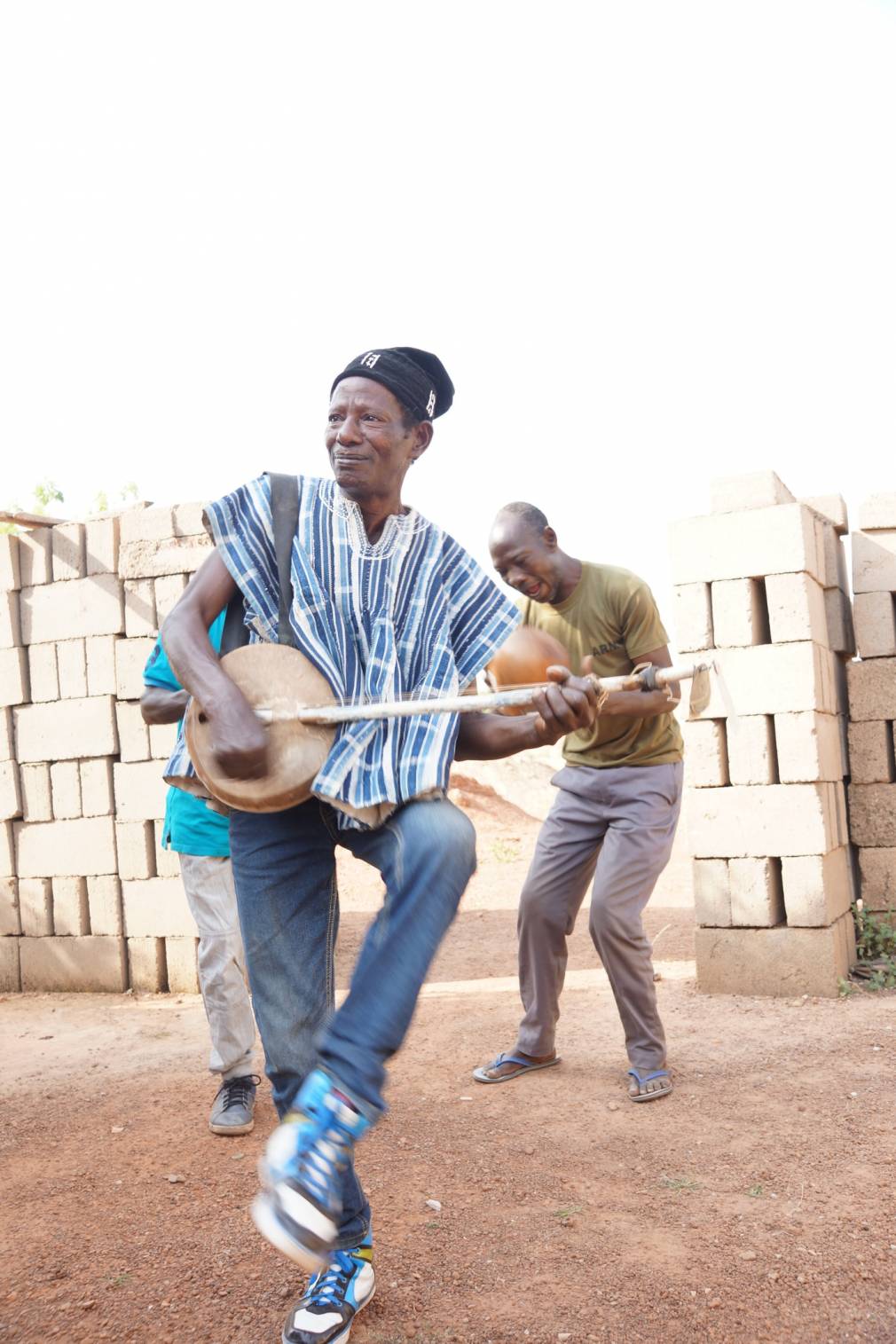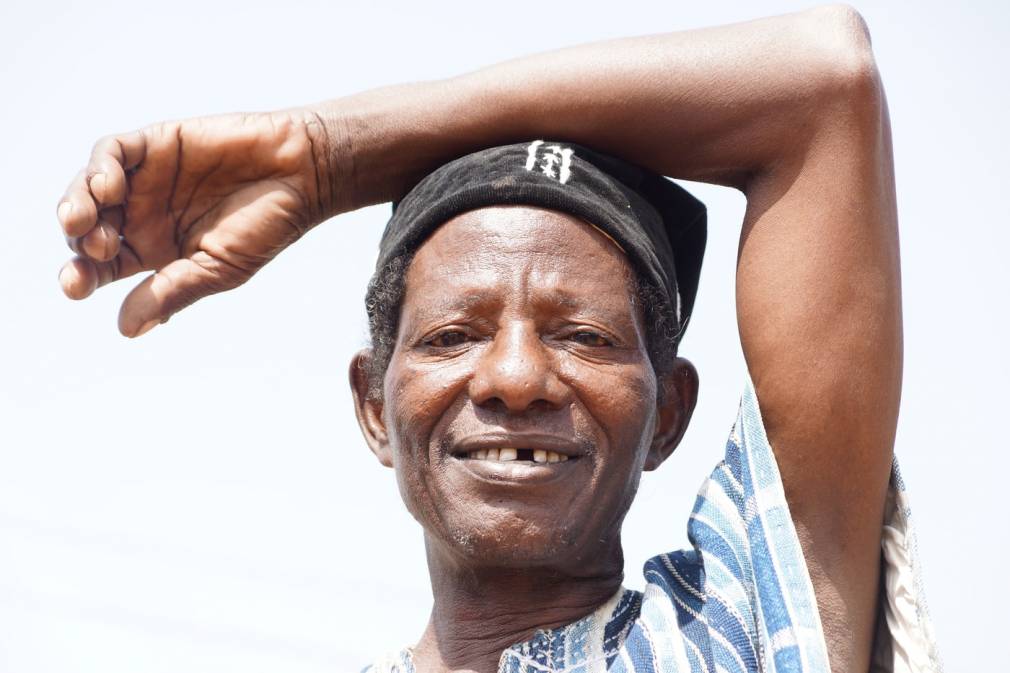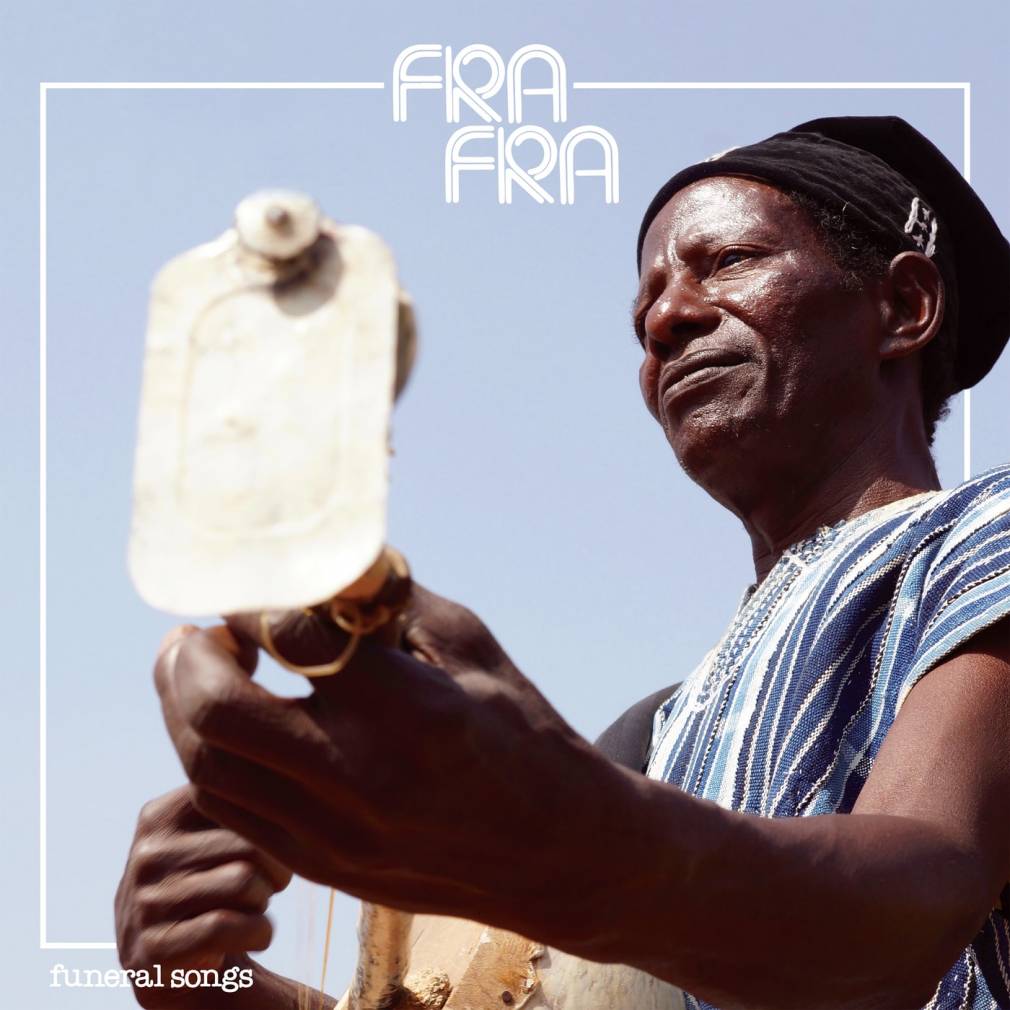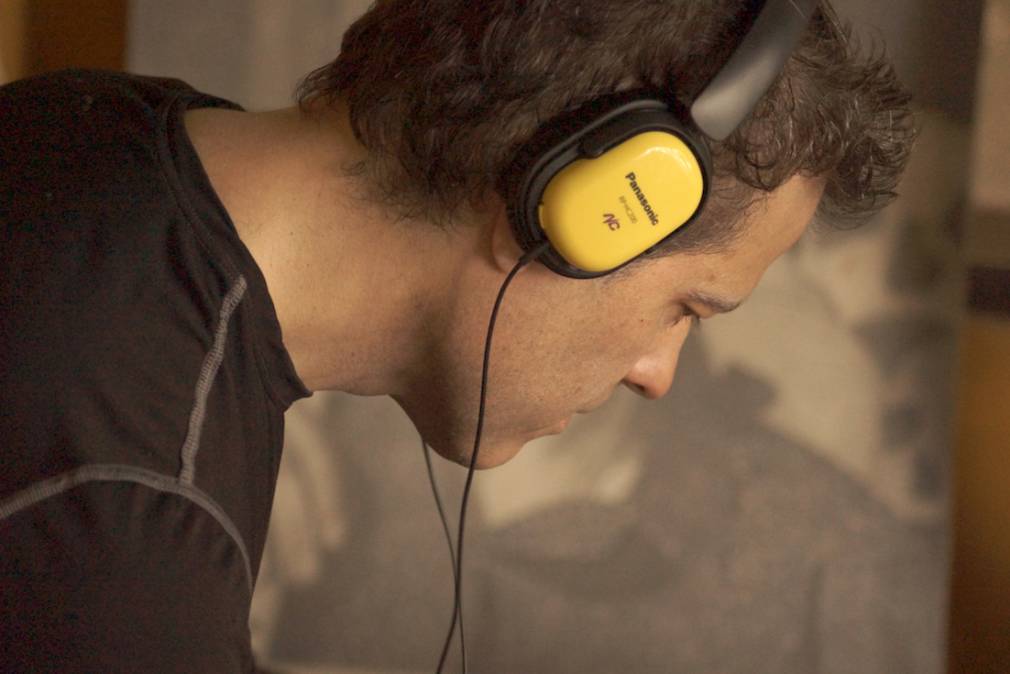The sixth edition of the impeccable Hidden Musics collection from label Glitterbeat, the fra fra funeral music of Ghana was recorded by American producer Ian Brennan. Interview.
Ian isn’t what you’d call a typical American. He could’ve finished somewhere in the backwoods, but he’s a musician, producer, and sound engineer. He’s also been an author for the last 19 years. In addition he’s produced over 30 albums recorded in Rwanda, Tanzania, South Sudan, Cambodia, Pakistan, and Ghana. An American passionate about “hidden” music managed to bring to light several obscure musical projects, notably a group of Malian prisoners who ended up earning a Grammy nomination. He is also the winner of a Grammy for his 2011 work and production on the album Tassili by Tinariwen. He’s spent studio time with the likes of Kyp Malone & Tunde Adebimpe (TV on the Radio), Flean, Bill Frisell, Dirty Dozen Brass Band… His latest book How Music Dies (or Lives): Field Recording and the Battle for Democracy in the Art is a «manual for those who seek authenticity in the era of pseudo artistes polluted by auto-tune”. Quarantined but still mixing, PAM joins Ian by Skype.
You are a musician, guitarist, author, and have recorded around 30 albums with both amateur and popular musicians of Africa. Where does your passion for the continent come from ?
I’ve been producing records since 1987 and I’ve been playing music my whole life. So I don’t remember ever not being preoccupied with music and the arts up to an almost unhealthy degree. And in the last 10 years or more, I’ve produced twenty-eight records with international artists from different continents: Asia, Africa, Middle East, Europe and trying to as much as possible provide platforms for original music and in regions and languages that tend to be underrepresented or in some cases unrepresented; meaning outside their own borders and with well-supported releases.
When did you start to be more interested in African music? How did you discover African music?
It was just a progression of being tired of the commercial system. I was gullible enough or romantic enough that, when I would hear talk of a great record, which was almost weekly because the weekly papers were required usually to champion more than one record a week, I would spend ten or twenty dollars to find out if it was true. And I didn’t have a lot of money. I just became tired of rarely finding something as strong as it was built up to be whether that was a film or a book or whether it was music, but in particular with music.
It sounded like an amalgam of so many artists that I’ve been listening to for almost ten years. When I first heard that record, I could hear nothing but the Pixies bassline with Sonic Youth guitars. So after that, in particular, I think it just got stale and more formulaic. It was probably around that time that I became more interested in what the rest of the world beyond straight white American males with standardly tuned guitars had to offer.
When was your first trip to Africa? Was it for music?
I began actively listening to music from around the world in the late 80s and early 90s. Then I began booking when I was doing political and charitable benefits in the late 90s and early 2000s, I began booking the artists from other places.
That kind of led to producing other people. Then in the summer of 2009, so eleven years ago now, Marilena DELLI, my wife, who does all the videos and photos for our projects, went to Rwanda with her mother, who’s Rwandan. She was visiting for the first time since the most recent genocide. When we were there, Marlena was making a documentary about her mother. We wanted to look for Rwandan music and people were very discouraging before we went. Some experts that we met said, “there’s no good music in Rwanda, blah, blah blah.” Which made it seem all the more important to find it. So we looked around and had some difficulty finding compelling things other than a lot of vintage from the 70s. But we were lucky enough to meet Adrian.
Adrian is one of the great folk songwriters in the world from anywhere. You know, the fact that he’s from Rwanda, from Africa, is coincidental in a sense. It made me more interested in doing what I can to bring his music to the world. And so we’ve gone on to do three albums with him. They’ve been able to come to the UK and Germany but they never got to France. They toured in Germany and came over to Belgium and the Netherlands and toured in the US this past fall. So it’s been good. I mean, they deserve a lot more than that, but it’s something because they were the first artists to widely release an album of original Kinyarwanda music ever.
Can you tell us more about the story of your latest record with the Fra Fra?
We went to northern Ghana for another project which will be coming out later this year. With the virus crisis, we don’t know when it was going to come out. Maybe July, maybe August; it might come out later or might even come out earlier at this point. Anyway, we were there for quite a while.
We were interested in meeting people and finding other music, and we found some, but nothing that was compelling. It was all good. A lot of people might like it better. The kind of groups that would do better at a club in Paris rather than the things I might be interested in. But in talking to people, I began to hear about the culture a little bit.
There is a funeral culture that can go on for days and up to a week. In the end, they use what they call horns, but are actually more like flutes made from Horn so they call them horns. I said, “well, that sounds like something worth at least trying to pursue and check out.” So we were lucky enough to meet up with Small. Small is one of those people that’s just a great individual artist, you know?

Small? That’s a nickname?
That’s his name, you know, and he’s 72. I would’ve guessed the guy is in his 40s or 50s, it’s incredible. He’s a virtuoso, which I don’t usually deal with. He’s very, very free. I think one of the beautiful things about the record is how the songs change. They don’t change in very obvious, prog rock ways, like, okay, now here’s section B. It’s just if you listen it becomes a different song, oftentimes midway. And sometimes it becomes a different song again before it’s over. So the recording process was interesting because it would usually get better the longer they played.
I think this is kind of the opposite of a lot of Western artists where they kind of go downhill after starting strong. There’s one song on the record that is almost 13 minutes and that’s a complete performance. So, it was a little tough in terms of recording because it was hard to know like, “maybe we should keep going forever?” It’s up to them when you stop or not. In some cases, they probably would have gone on forever, you know. But then they’d kind of stop and be like, let’s try something else, but you never know. If they did it again, it would be different. I’m sure. Each time. But there was this trend of just getting stronger the longer and the more they played.
So what kind of equipment did you use for this specific recordings, there are 3 main instruments?
Yeah. There’s the KOLOGO, which is a two string guitar. There’s the kalabash, and it’s pretty prominent, it’s a longer neck to string guitar. He put dog tags on the head as noise modification, you know, distortion. Then flutes on some songs. Horns on some songs. We recorded outdoors and I used the mobile setup. I use it everywhere. I use slightly different microphones depending on the situation. This was more challenging in a sense because they move so much. These guys dance when they’re doing it and it was a pretty hot day. We weren’t there in the hot season, but we were recording late morning to midday. So it was outside and part of the day they were in the sun. It was not easy in that regard. Because of the movement, it was a little more challenging, in the traditional sense.
Was it during a real funeral ceremony?
No, it was not. I don’t think I would. I mean, I could see that from an ethnomusicology standpoint. I’m not an ethnomusicologist, but I could see the attraction of that. But I would be pretty concerned about that. I don’t want to intrude.
When they came they were playing. They were ready. It didn’t take them time to warm up. They came warmed up. They were already playing music the minute they got there. Luckily I was set up and ready to go, too so it worked out pretty well. There was no hesitation or ambivalence or artifice about what they were doing. They were there to play and they did so.

Do you have any understanding of the lyrics, the call and response?
Well, it’s not so much prayers. Most of the themes are around death and funerals and mourning. In most cases, the lyrics are not over elaborate. They would have two of small sons translate, and our friend Sammy would translate. It would give us a broader sense of the song.
I believe in most cases that pop lyrics aren’t that good anywhere you go, with rare exception. They are secondary. So there is sometimes this sense that foreign language is an obstacle, which I think is just English language speaking people being lazy because they wouldn’t be able to tell you what most songs in English say either.
Like, if you ask them to explain what a song is about, they’re probably wrong. So I don’t see language as an obstacle. I think that listening to people singing and not knowing exactly what they’re saying demands more attention to what’s actually being communicated and what’s real about the performance as opposed to the intellectual part of it.
Would you say this music is healing? Is that the aim?
It’s interesting because there’s a parallel between some of the other hidden music series that I’ve done. I’ve done all of them but one for GlitterBeat, I believe. We did one with with the war veterans in Vietnam and one with the Khmer Rouge survivors in Cambodia.
For the one in Vietnam, one of the singers was a master of form. He came to the UK and performed a few years back. What he does is similar to what Fra Fra does in that he does death rites for people and in their tradition, it’s similar. He also plays along with guitar mostly, but it’s similar in that the mourning goes on for as long as the family feels it’s necessary. For some people that may be an hour, and for some people, it can go on all night and beyond where he’s performing with them and actually helping out.
From what I understand of his role in that tradition he’s helping people to say goodbye to their loved ones and helping the spirit make its way into the next world. It’s a similar thing but it’s done in a way which seems to share a lot with some of the New Orleans marching bands. You know, the funeral tradition, especially on the way back from the cemetery. I mean, the tradition you made. You probably know that the tradition on the way there is sad. But coming back, it’s happy. I mean, that’s a very gross oversimplification. This shares that. There’s a certain joy and celebration of the life that’s going on.
You started your career working in psychiatric fields, are you in a way doing the same kind of job?
I believe that the music is medicine and it’s healing potential. It’s the best social work there is. A lot of people have been healed a lot more by an artist or a song or an album or a book or a movie than they have by loved ones and by someone they paid to help them like a psychiatrist or psychologist, whether it’s intentional or not, on the part of the artists.
I think a lot of times as somebody who has a higher spiritual intention as an artist, that is able to offer that to people. I think people are hungering for that. That’s why I think that the corporations do people a disservice by. But it’s the same way with food. They do them a disservice by feeding them with McDonald’s, which is fine. I mean, it’s something. It’s calories, but versus something healthier.
It’s the same thing, I think, with art. It’s not a desire to be highbrow, because it’s sometimes the most simple and mental, minimalistic and even catchy things are the most emotionally powerful. I aspire to that. I hope for that. I do know that having that background has proved helpful just in terms of probably interacting with people and also in certain situations being more at peace or calm in situations that other people might find more upsetting or alien to them.
Like in the Zomba Prison in Malawi, that was a fairly familiar environment. I mean, that didn’t feel like a foreign environment. In some ways I was more at home in that institution in Malawi than I would be in France, even though France culturally is closer to the US and or in England,, which is even closer in many ways, language and otherwise with the US. But being in an institution it felt like, well, this is pretty familiar, you know?
I wanted to ask you to present the Hidden Music Series. How did you come up with the idea?
Oh, well, the idea wasn’t mine. GlitterBeat was a relatively new label at the time and they’ve gone on to win I think six Womex Festival in a row, which is unprecedented. I don’t think anybody’s even won twice in a row or more than twice in a row. They were a relatively young label and when I first met them and started talking with them was when I was about to do the Vietnam project and he said all this would be perfect for this thing we’re doing. So we did it. Then it just turned out that the majority of the releases and the Hidden Music Series have been the ones that I produced. I was, in a sense, already doing that. It’s going out and seeking in regions that were underrepresented.
If all goes according to plan, we have two or three more already, hopefully going to come out in the next year.
fra fra, Funeral Songs, is available on digital and physical via Glitterbeat Records.





